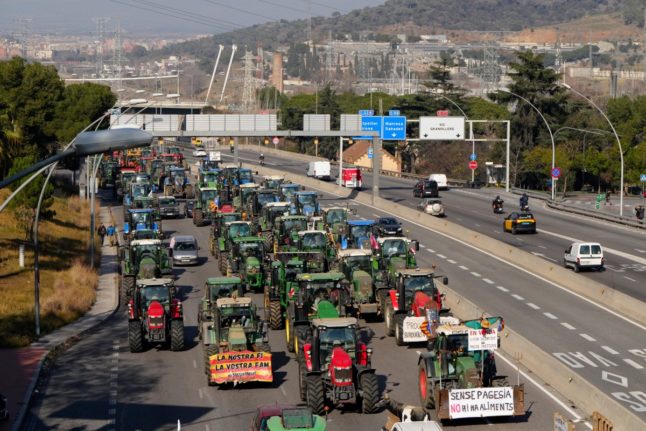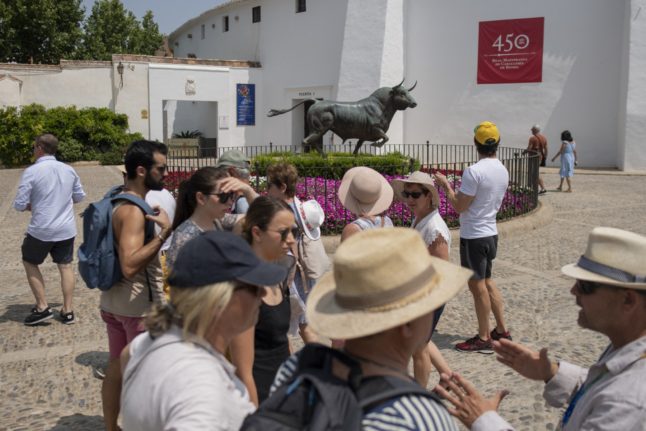The ongoing industrial action by Spanish farmers and agricultural workers has entered its second week and shows no sign of slowing down, with farmers taking their tractors onto the streets and cutting off major motorways throughout Spain. They plan to maintain their street protests across the country for at least the rest of February, according to the updated schedules of different agricultural groups and organisations.
In recent days some demonstrations have turned violent, with arrests and clashes with police leading the 6-F group, the organisation behind many of the protests, to call for the resignation of Spain’s Interior Minister and threaten legal action.
READ ALSO: How long will the farmers’ roadblocks in Spain last?
Hauliers had called an indefinite strike alongside the agricultural protests, something that threatened to compound the travel and supply chain chaos, but called off their action on Monday, just days after starting it.
Where are farmers protesting in Spain on Tuesday?
For live updates, this map by the DGT will help. The people and tractor icons are where the protests are happening, as well updating the traffic situation as it develops.
According to provisional scheduling released last week by 6-F group, the organisation behind many of the tractor protests, farmers in La Rioja and Zaragoza are set to take to the roads on Tuesday and there will also be protests called by Unión de Uniones in the ports of Tarragona and Santander.
Confirmed road closures and/or delays on Tuesday 13th February (as of 17.30):
Barcelona (C-17 via Vic)
Granada (A-92 Peñuelas)
Seville (A-4 Écija, A-92 Las Monjas, A-471R1 Las Cabezas de San Juan)
Cádiz (A-7 Cortijillos, A-381 Jerez de la Frontera)
Girona (N-II Bàscara and Pontós, AP-7 Vilademulls, C-38 in Molló)
Badajoz (N-435 Almendral, N-430 Casas de Don Pedro, EX -107 Villareal)
Cuenca (A-3 Belinchón)
Córdoba (A-306 Cañete de las Torres)
Ciudad Real (CM-3166 Campo de Criptana)
Valladolid (N-122 Peñafiel, A-6)
Burgos (N-120 Belorado)
La Rioja (N-232 Calahorra)
Teruel (A-23 in direction of Teruel capital)
DGT traffic warnings due to protests (as of 14:00):
Cádiz (A-2004 Solete Alto)
Málaga (A-384 Teba)
Huesca (N-240 Monzón)
Badajoz (N-430 Casas de Don Pedro)
Barcelona (C-37 Malleu, C-25 Gurb)
Europa Press is also reporting this morning that tractors are congregating in Mercabarna, Port de Tarragona and Pontós (Girona), so traffic could be severely delayed there too.
The DGT Twitter/X account is also providing traffic updates throughout the day:
📢🚜Actualizamos las vías que permanecen intransitables por las marchas agrícolas.
⚫️Andalucía:
SEVILLA
➡️A-4 Écija.
➡️A-92 Las Monjas.CÁDIZ
➡️A-381 A-381 Jerez de la Frontera.
⚫️Extremadura:
BADAJOZ
➡️N-435 Almendral. pic.twitter.com/oPwkxxUr89
— Dir. Gral. Tráfico (@DGTes) February 13, 2024
Why are Spanish farmers protesting?
As the EU’s biggest fruit and vegetable exporter, Spain has long enjoyed the moniker of Europe’s ‘vegetable garden’ but in reality the farmers that produce these goods are facing significant difficulties and are concerned for the future of the agricultural sector.
READ ALSO: EXPLAINED: Why are farmers in Spain protesting?
Like farmers in France but also Germany and Belgium, Spanish farmers are taking their tractors onto the streets to demand fair prices for their products, raise issue with the green agenda and unfair competition (an EU-wide problem and something French farmers accuse Spanish farmers of), asking for common agricultural policy rules to be softened and food chain law to respected, as well as calling for tax benefits on agricultural diesel to be extended.
MORE TO FOLLOW.



 Please whitelist us to continue reading.
Please whitelist us to continue reading.
Member comments